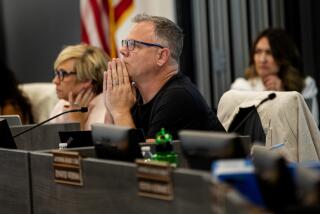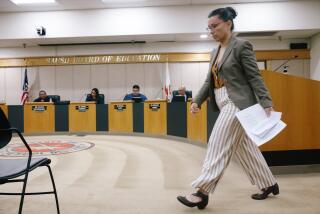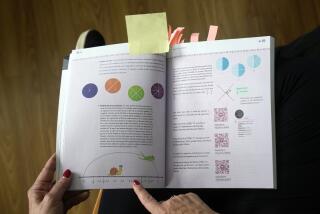Lessons of History Are Changing in Hong Kong
- Share via
HONG KONG — When Elsie Tu taught history here in the 1950s, she found herself apologizing often to her students, because, she notes, “I told them about the Opium Wars. I told them the facts--how Britain bought tea and paid with opium which got the Chinese hooked.”
Her version differed from the one in British textbooks then used in this colony, which taught that the mid-19th century wars were triggered by China’s refusal to open its borders to foreign merchants and to let Britain keep its opium trade.
Her Chinese students were “horrified” to hear Tu, a sprightly Briton, tell of the conduct of Westerners, a description considered more historically accurate today, she said, adding: “They would ask, ‘Why did your country do this to us?’ I used to apologize so much in those days.”
Although almost 40 years have passed since Tu, 82, grappled with history, in the last months of British rule these same tough issues have sparked heated debates among top officials of the governments of China and Hong Kong.
Chinese Foreign Minister Qian Qichen rekindled fears of revisionism recently when he said Hong Kong texts that do not conform to China’s view should be rewritten.
“The contents of some textbooks currently used in Hong Kong do not accord with history or reality, are not suited to the changes after 1997 . . . and must be revised,” Qian told the National People’s Congress, China’s nominal parliament.
While Qian gave no details of changes he had in mind, his comments hit a raw nerve in this territory anxiously awaiting Chinese rule. An editorial in the daily Hong Kong Standard bristled, “Leave politics out of textbooks.”
Chris Patten, Hong Kong’s last British governor, said he fears Qian’s remarks mean that China will push for more revisions in schoolbooks than are already in the works--changes such as references to China, not the queen of England, as the sovereign. China also will no longer be described as a “neighboring country,” because Hong Kong will be part of it after the July 1 hand-over.
But Patten warned against rewriting history, saying: “Naturally, schoolchildren will need to be taught after 1997 about their new sovereign power. . . . But if Mr. Qian is suggesting more than this, his statement raises some disturbing questions. In a free society, teachers are not told what facts they can teach and what facts it is politically wrong for them to teach.”
History books being written for the post-hand-over curriculum contain much potential for controversy: They will, for example, for the first time describe the 1989 massacre of pro-democracy demonstrators in Beijing’s Tiananmen Square.
Hong Kong’s Preparatory Committee, a group of Chinese and Hong Kong leaders charged with smoothing the hand-over, has issued guidelines to publishers and authors about how to describe “sensitive” historical events.
Balancing the contesting versions of history is difficult, said Alberto Morales, who has written texts under a colonial mandate for decades.
“I just don’t want to think of the hard bits, like writing about Tiananmen, about the Cultural Revolution,” he said, adding with a shrug that the best way to work is to keep his head down “like an ostrich” and follow the guidelines.
Morales, who has lived in Hong Kong since 1958, is scrutinizing every sentence in revised secondary school editions he is readying for the 1999 academic year.
Adhering to the Preparatory Committee guidelines, he has dropped references to Taiwan as the Republic of China, to emphasize Beijing’s view that the Nationalist island is a province of China and not an independent country. He also explains that Hong Kong was inhabited by indigenous people for hundreds of years before the British arrived and was not “a barren rock,” as it is often described in older texts.
Meantime, many people here defend China’s right to rewrite texts, noting that many works now reflect a British bias.
“Ten or 20 years ago, textbooks used were translated from works of Western scholars who wrote them from a Western point of view,” said Rodney Tsui, managing director of New Asia Publishing House. He believes that as Hong Kong’s sovereignty changes, so too will people’s perceptions of national identity.
“Whether we are from Hong Kong, China or Taiwan, I believe our viewpoint is the same--that the Opium War was not a trade war but an act of expansionism or militarism on the part of Britain,” Tsui said. “It is like the Japanese saying their actions in World War II were not aggression.”
One pro-China headmaster, who has spent his career teaching history in a way that often made the British unhappy, suddenly finds the curriculum in accord with his view.
“In the ‘50s, it was not unusual for the Education Department to send inspectors to the school to look at books in the library. Any books of a political nature were not allowed, for instance the works of Mao Tse-tung,” said Tsang Yok-sing, principal of the 50-year-old Pui Kiu Middle School, which has always supported Beijing, even in the dark days of the Cultural Revolution.
“Our second headmaster was deported in 1958 for political reasons,” he recalled. “The school was raided at dawn. He was taken out of his bed and shoved across the border.”
Now, that headmaster would have no trouble finding a job.
“Things,” Tsang said with a chuckle, “have actually changed quite a lot.”
More to Read
Sign up for Essential California
The most important California stories and recommendations in your inbox every morning.
You may occasionally receive promotional content from the Los Angeles Times.













